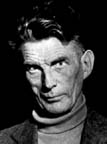|

|
|

|
.
|
Culture, history,
language, travel,
and more!
|
|
|
SAMUEL BECKETT - Dramatist
|

The Irish-born
playwright and novelist Samuel Beckett, b. Dublin, Apr. 13, 1906, d.
Dec. 22, 1989, is best known for the absurdist drama Waiting for
Godot (1952; Eng. trans., 1954). First performed in Paris on Jan.
5, 1953, the play received worldwide acclaim and became the first of
a series of critical successes, some of them written earlier.
Life
Beckett came from a
Protestant Anglo-Irish family, but much of his work was first written
in French. After graduating with a degree in Romance languages from
Trinity College, Dublin, Beckett spent two years (1928-30) in Paris
as an exchange lecturer. Here he met James Joyce and became a member
of his circle. In 1930, Beckett returned to Trinity as a lecturer.
 The academic life did not
agree with him, however, and he left after only four terms to become
a free-lance writer. He traveled in Europe and England, settling
finally in Paris, his intermittent home since 1937.
The academic life did not
agree with him, however, and he left after only four terms to become
a free-lance writer. He traveled in Europe and England, settling
finally in Paris, his intermittent home since 1937.
Writings
Beckett's entire
literary output, the narrative prose as well as the dramatic works,
reduces basic existential problems to their most essential features.
His concerns are fundamental, but never simplistic -- the evanescence
of life; time and eternity; the individual's sense of loneliness and
alienation as a result of the impossibility of establishing genuine
communication and contact with others; the mystery of self.
Beckett's major
early works constitute a trilogy of interior monologues:
Molloy (1951; Eng. trans., 1955), Malone Dies (1951;
Eng. trans., 1956), and The Unnameable (1953; Eng. trans.,
1958). Here Beckett explores the paradox of the self that can never
know itself; in the very act of observing itself the self splits in
two, an observing consciousness and an object that is being observed.
The self perceives itself as a stream of words, a narration. Each
time it tries to catch up with itself, it merely turns into another
story, thus putting before the reader a succession of storytellers.
Beckett's other prose works also view in various ways the entrapment
and anguish of the individual in increasingly grotesque situations
and the self's quest for identity from within. These include
Murphy (1938; Eng. trans., 1957); Watt (1953), his last
novel in English; and, Stories and Texts for Nothing (1955;
Eng. trans., 1967), a collection of short stories.
Among his principal
plays, pioneering works in the theater of the absurd, are
Endgame (1957; Eng. trans., 1958), Krapp's Last Tape
(1959), Happy Days (1961), Play (1964), Not I
(1973), That Time (1976), and Footfalls (1976). He has
also written radio and television plays. In his later stage and
television plays, Beckett's style is so concise that each work is
ultimately reduced to a compressed, immensely powerful image.
Beckett received the
Nobel Prize for literature in 1969. The 16-volume Collected Works
were published in 1970. Beckett's first play, Eleutheria (1947), was
published for the first time in 1995, in an English translation,
after a protracted dispute between Barney Rosset, Beckett's friend
and American publisher and Beckett's family and his French publishers
-- who did not want it printed because Beckett himself had judged the
play a failure. Nevertheless, the play introduces ideas that Beckett
successfully amplified in his later work, and anticipates the work of
Eugene Ionesco and others in its use of the dramatic techniques
associated with the theater of the absurd.
Martin Esslin, Professor of Drama, Stanford University, Stanford, Calif.
Source: 1997 Grolier Multimedia Encyclopedia v.9.0.1
Bibliography: J. Acheson and K. Arthur, Beckett's Later Fiction and Drama (1987);
A. Astro, Understanding Samuel Beckett (1990);
S.B. Beckett, Endgame: Production Notebook, rev. ed. (1993);
L. Ben-Zvi, ed., Women in Beckett (1992);
E. Brater, Beyond Minimalism: Beckett's Late Style in the Theatre (1987)
and, as ed, Beckett at 80 (1986);
B. Cochran, Samuel Beckett: A Study of the Short Fiction (1992);
R. Cohn, Back to Beckett (1974) and Just Play: Beckett's Theatre (1980);
M. Esslin, Samuel Beckett: A Collection of Critical Essays (1975);
S.E. Gontarski, ed., On Beckett (1986);
L.E. Harvey, Samuel Beckett (1970);
J. Kalb, Beckett in Performance (1989);
H. Kenner, Samuel Beckett (1974);
V. Mercier, Beckett/Beckett (1977);
Eoin O'Brien, The Beckett Country (1986);
J. Pilling, ed., The Cambridge Companion to Beckett (1994);
R. Rabinovitz, The Development of Samuel Beckett's Fiction (1984)
and Innovation in Samuel Beckett's Fiction (1992);
C. Ricks, Beckett's Dying Words: The Clarendon Lectures, 1990 (1993).
Image Source: portrait of Samuel Beckett - Bettmann Archive.
|
Playwright Biographies:
|

|
|
|
Beckett Links:
|

|
|
-
(links under construction)
|
|
|

|
Design and layout
©
1997-2000
|
All Rights Reserved
|
Comments, suggestions,
broken links?
|

|
Produced by
The Wharton Group
and
Ian C. Mills
|

Please notify us!
|
The Y29K
- compliant computer
preferred by designers everywhere.
|
|
This site
recycled
|

|
uses
electrons.
|
|
visitors
|
 Text and image copyrights are attributed to their
respective sources throughout this site.
Text and image copyrights are attributed to their
respective sources throughout this site.
|
|

 The academic life did not
agree with him, however, and he left after only four terms to become
a free-lance writer. He traveled in Europe and England, settling
finally in Paris, his intermittent home since 1937.
The academic life did not
agree with him, however, and he left after only four terms to become
a free-lance writer. He traveled in Europe and England, settling
finally in Paris, his intermittent home since 1937.